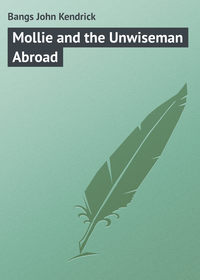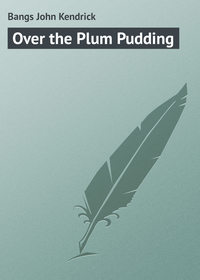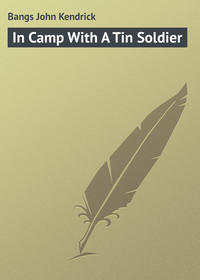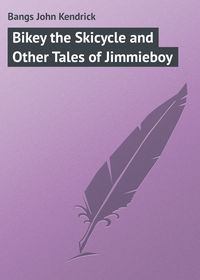
"That was just it," returned the Blank-book. "She had been a little girl herself, and she was too proud to live. If she had been a boy instead of a girl, it would have been the boy who was made of sugar and spice and all that's nice."
"Didn't your dream-poet ever write anything funny in you?" asked Jimmieboy. "I do love funny poems."
"Well, I don't know whether some of the things he wrote were funny or not," returned the Blank-book, scratching his cover with a pencil he carried in a little loop at his side. "But they were queer. There was one about a small boy, named Napples, who spent all his time eating apples, till by some odd mistake he contracted an ache, and now with J. Ginger he grapples."
"That's the kind," said Jimmieboy. "I think to some people who never ate a green apple, or tasted Jamaica ginger, or contracted an ache, it would be real funny. I don't laugh at it, because I know how solemn Tommy Napples must have felt. Did you ever have any more like that?"
"Oh my, yes," returned the Blank-book. "Barrels full. This was another one – only I don't believe what it says is true:
"A man living near Navesink,Eats nothing but thistles and zinc,With mustard and glue,And pollywog stew,Washed down with the best of blue ink.'""That's pretty funny," said Jimmieboy.
"Is it?" queried the Blank-book, with a sigh. "I'll have to take your word for it. I can't laugh, because I have nothing to say ha! ha! with, and even if I could say ha! ha! I don't suppose I'd know when to laugh, because I don't know a joke when I see one."
"Really?" asked Jimmieboy, who had never supposed any one could be born so blind that he could not at least see a joke.
"Really," sighed the Blank-book. "Why, a man came into the store where I was for sale once, and said he wanted a Blank-book, and the clerk asked him what for – meaning, of course, did he want an account-book, a diary, or a copy-book. The man answered, 'To wash windows with, of course,' and everybody laughed but me. I simply couldn't see the point. Can you?"
"Why, certainly," said Jimmieboy, a broad smile coming over his lips. "It was very funny. The point was that people don't wash windows with Blank-books."
"What's funny about that?" asked the Blank-book. "It would be a great deal funnier if people did wash windows with a Blank-book. He might have said 'to go coasting on,' or 'to sweeten my coffee with,' or 'to send out to the heathen,' and it would have been just as funny."
"I guess that's true," said Jimmieboy. "But it was funny just the same."
"No doubt," returned the Blank-book; "but it seems to me what's funny depends on the other fellow. You might get off a splendid joke, and if he hadn't his joke spectacles on he'd think it was nonsense."
"Oh no," said Jimmieboy. "If he hadn't his joke spectacles on he wouldn't think it was nonsense. Jokes are nonsense."
"But you said a moment ago the fun of the Blank-book joke was that you couldn't wash windows with one. That's a fact, so how could it be nonsense?"
"I never thought of it in that way," said Jimmieboy.
"Ah!" ejaculated the Blank-book. "Now that is really funny, because I don't see how you could think of it in any other way."
"I don't see anything funny about that," began Jimmieboy.
"Oh dear!" sighed the Blank-book. "We never shall agree, except that I am willing to believe that you know more about nonsense than I do. Perhaps you can explain this poem to me. I dreamt my poet wrote this on my twelfth page. It was called 'A Plane Tale:'
"'I used to be so surly, thatAll men avoided me;But now I am a diplomat,Of wondrous suavity."'I met a carpenter one night,Who wore a dotted vest;And when I asked if that was right,He told me to go West."'I seized his saw and brandished it,As fiercely as I could,And told him, with much show of wit,I thought he was no good."'At that he looked me in the face,And said my tone was gruff;My manner lacked a needed grace,In every way was rough."'He seized and laid me on a plank,He gave a little cough;And then, although my spirits sank,He planed me wholly off!"'And ever since that painful night,When he so treated me,I've been as polished, smooth a wight,As any one can be.'""There isn't much sense in that," said Jimmieboy.
"Well, now, I think there is," said the Blank-book. "There's a moral to that. Two of 'em. One's mind your own business. If the carpenter wanted to wear a dotted vest it was nobody's affair. The other moral is, a little plane speaking goes a great way."
"Oh, what a joke!" cried Jimmieboy.
"I didn't make any joke," retorted the Blank-book, his Russia-leather cover getting red as a beet.
"Yes, you did, too," returned Jimmieboy. "Plane and plain – don't you see? P-l-a-n-e and p-l-a-i-n."
"Bah!" said the Blank-book. "Nonsense! That can't be a joke. That's a coincidence. Is that what you call a joke?"
"Certainly," replied Jimmieboy.
"Well, then, I'm not as badly off as I thought. I wanted to be a poet's book and couldn't, but it is better to be used for a wash-list as I am than to help funny men to remember stuff like that. I am very grateful to you, Jimmieboy, for the information. You have made me see that I might have fared worse than I have fared, and I thank you, and as I hear your mamma and papa coming up the stairs now, I'll run back to the desk. Good-night!"
And the Blank-book kissed Jimmieboy, and scampered over to the desk as fast as it could, and the next day Jimmieboy begged so hard for it that his mamma gave it to him for his very own.
"What shall you do with it now that you have it?" asked mamma.
"I'm going to save it till I grow up," returned Jimmieboy. "Maybe I'll be a poet, and I can use it to write poems in."
XII.
JIMMIEBOY AND THE COMET
Jimmieboy was thinking very hard. He was also blinking quite as hard because he was undeniably sleepy. His father had been reading something to his mamma about a curious thing that lived up in the sky called a comet. Jimmieboy had never seen a comet, nor indeed before that had he even heard of one, so of course his ideas as to what it looked like were rather confused. His father's description of it was clear enough, perhaps, but nevertheless Jimmieboy found it difficult to conjure up in his mind any reasonable creature that could in any way resemble a comet. Finally, however, he made up his mind that it must look like a queer kind of a dog with nothing but a head and a tail – or perhaps it was a sort of fiery pollywog.
At any rate, while he thought and blinked, what should he see peeping in at him through the window but the comet itself. Jimmieboy knew it was the comet because the comet told him so afterward, and besides it wore a placard suspended about its neck which had printed on it in great gold letters: "I'm the Comet. Come out and take a ride through the sky with me."
"Me?" cried Jimmieboy, starting up as soon as he had read the invitation.
Immediately the word "Yes" appeared on the placard and Jimmieboy walked over to the window and stepping right through the glass as though it were just so much air, found himself seated upon the Comet's back, and mounting to the sky so fast that his hair stood out behind him like so many pieces of stiff wire.
"Are you comfortable?" asked the Comet, after a few minutes.
"Yes," said Jimmieboy, "only you kind of dazzle my eyes. You are so bright."
The Comet appeared to be very much pleased at this remark, for he smiled so broadly that Jimmieboy could see the two ends of his mouth appear on either side of the back of his neck.
"You're right about that," said the Comet. "I'm the brightest thing there ever was. I'm all the time getting off jokes and things."
"Are you really?" cried Jimmieboy, delighted. "I am so glad, for I love jokes and – and things. Get off a joke now, will you?"
"Certainly," replied the obliging Comet. "You don't know why the moon is called she, do you?"
"No," said Jimmieboy. "Why is it?"
"Because it isn't a sun, so it must be a daughter," said the Comet. "Isn't that funny?"
"I guess so," said Jimmieboy, trying to look as if he thought the joke a good one. "But don't you know anything funnier than that?"
"Yes," returned the Comet. "What do you think of this: What is the only thing you can crack without splitting it?"
"That sounds interesting," said Jimmieboy, "but I'm sure I never could guess."
"Why, it's a joke, of course," said the Comet. "You can crack a joke eight times a day and it's as whole as it ever was when night comes."
"That's so," said Jimmieboy. "That's funnier than the other, too. I see now why they call you a Comic."
"I'm not a Comic," said the Comet, with a laugh at Jimmieboy's mistake. "I'm a Comet. I end with a T like the days when you have dinner in the afternoon. They end with a tea, don't they?"
"That's the best, yet," roared Jimmieboy. "If you give me another like that I may laugh harder and fall off, so I guess you'd better hadn't."
"How would you like to hear some of my poetry?" asked the Comet. "I'm a great writer of poetry, I can tell you. I won a prize once for writing more poetry in an hour than any other Comet in school."
"I'm very fond of it," said Jimmieboy. "Specially when it don't make sense."
"That's the kind I like, too," agreed the Comet. "I never can understand the other kind. I've got a queer sort of a head. I can't understand sense, but nonsense is as clear to me as – well as turtle soup. Ever see any turtle soup?"
"No," said Jimmieboy, "but I've seen turtles."
"Well, turtle soup is a million times clearer than turtles, so maybe you can get some idea of what I mean."
"Yes," said Jimmieboy. "I think I do. Nonsense poetry is like a window to you. You can see through it in a minute."
"Exactly," said the Comet. "Only nonsense poetry hasn't any glass in it, so it isn't exactly like a window to me after all."
"Well, anyhow," put in Jimmieboy. "Let's have some of the poetry."
"Very good," said the Comet. "Here goes. It's about an animal named the Speeler, and it's called 'The Speeler's Lament.'
"Oh, many years ago,When Jack and Jill were young,There wandered to and fro,Along the glistening snow,A Speeler, much unstrung."I asked the Speeler whyHe looked so mortal sad?He gazed into my eye,And then he made reply,In language very bad,"'I'm sad,' said he, 'becauseA Speeler true I be;And yet, despite my jaws,My wings, and beak, and claws,Despite my manners free,"'Despite my feathers fine,My voice so soft and sweet,My truly fair outline,My very handsome spine,And massive pair of feet,"'In all this world of space —On foot, on fin, on wing —From Nature's top to base,There never was a traceOf any such strange thing."'And it does seem to me —Indeed it truly does —'Tis dreadful, sir, to be,As you can plainly see,A thing that never was!'""What's a Speeler?" said Jimmieboy.
"It isn't anything. There isn't any such thing as a Speeler and that's what made this particular Speeler feel so badly," said the Comet. "I know I'd feel that way myself. It must be dreadful to be something that isn't. I was sorry after I had written that poem and created the poor Speeler because it doesn't seem right to create a thing just for the sake of making it unhappy to please people who like poetry of that kind."
"I'm afraid it was a sensible poem," said Jimmieboy. "Because, really, Mr. Comet, I can't understand it."
"Well, let me try you on another then, and take away the taste of that one. How do you like this. It's called 'Wobble Doo, the Squaller.'
"The Wobble Doo was fond of pie,He also loved peach jam.But what most pleased his eagle eye,Was pickled cakes and ham."But when, perchance, he got no cake,Jam, ham, or pie at all,He'd sit upon a garden rake,And squall, and squall, and squall."And as these never came his way,This hero of my rhyme,I really do regret to say,Was squalling all the time.""Your poems are all sad, aren't they?" said Jimmieboy. "Couldn't you have let Wobble Doo have just a little bit of cake and jam?"
"No. It was impossible," replied the Comet, sadly, "I couldn't afford it. I did all I could for him in writing the poem. Seems to me that was enough. It brought him glory, and glory is harder to get than cakes and peach jam ever thought of being. Perhaps you'll like this better:
"Abadee sollaker hollaker moo,Carraway, sarraway mollaker doo —Hobledy, gobbledy, sassafras Sam,Taramy, faramy, aramy jam.""I don't understand it at all," said Jimmieboy. "What language is it in?"
"One I made up myself," said the Comet, gleefully. "And it's simply fine. I call it the Cometoo language. Nobody knows anything about it except myself, and I haven't mastered it yet – but my! It's the easiest language in the world to write poetry in. All you have to do is to go right ahead and make up words to suit yourself, and finding rhyme is no trouble at all when you do that."
"But what's the good of it?" asked Jimmieboy.
"Oh, it has plenty of advantages," said the Comet, shaking his head wisely. "In the first place if you have a language all your own, that nobody else knows, nobody else can write a poem in it. You have the whole field to yourself. Just think how great a man would be if he was the only one to understand English and write poetry in it. He'd get all the money that ever was paid for English poetry, which would be a fortune. It would come to at least $800, which is a good deal of money, considering."
"Considering what?" asked Jimmieboy.
"Considering what it would bring if wisely invested," said the Comet. "Did you ever think of what $800 was worth in peanuts, for instance."
Jimmieboy laughed at the idea of spending $800 in peanuts, and then he said: "No, I never thought anything about it. What is it worth in peanuts?"
"Well," said the Comet, scratching his head with his tail, "it's a very hard bit of arithmetic, but, I'll try to write it out for you. Peanuts, you know, cost ten cents a quart."
"Do they?" said Jimmieboy. "I never bought a whole quart at once. I've only paid five cents a pint."
"Well, five cents a pint is English for ten cents a quart," said the Comet, "and in $800 there are eight thousand ten centses, so that you could get eight thousand quarts of peanuts for $800. Now every quart of peanuts holds about fifty peanut shellfuls, so that eight thousand quarts of peanuts equal four hundred thousand peanuts shellfuls. Each peanut shell holds two small nuts so that in four hundred thousand of them there are eight hundred thousand nuts."
"Phe-e-ew!" whistled Jimmieboy. "What a feast."
"Yes," said the Comet, "but just you wait. Suppose you ate one of these nuts a minute, do you know how long it would take you, eating eight hours a day, to eat up the whole lot?"
"No," said Jimmieboy, beginning to feel a little awed at the wondrous possibilities of $800 in peanuts.
"Four years, six months, three weeks and six days, and you'd have to eat Sundays to get through it in that time," said the Comet. "In soda water it would be quite as awful and in peppermint sticks at two cents a foot it would bring you a stick forty thousand feet, or more than seven miles long."
"Isn't $800 wonderful," said Jimmieboy, overcome by the mere thought of so much peppermint candy.
"Yes – but really I am much more wonderful when you think of me. You haven't been on my back more than ten minutes and yet in that time I have taken you all around the world," said the Comet.
"All the way!" said Jimmieboy.
"Yes," said the Comet, stopping suddenly. "Here we are back at your window again."
"But I didn't see China, and I wanted to," said the boy.
"Can't help it," said the Comet. "You had your chance, but you preferred to talk about poetry and peanuts. It isn't my fault. Off with you, now."
And then the Comet bucked like a wild Western Broncho, and as Jimmieboy went over his head through the window and landed plump in his papa's lap, the queer creature with the fiery tail flew off into space.
XIII.
JIMMIEBOY AND JACK FROST – IN WHICH JACK GIVES OFFENCE
Jimmieboy is the proud possessor of a small brother, who, to use one of Jimmieboy's own expressions, is getting to be a good deal of a man. That is to say, he is old enough to go out driving all by himself, being eleven months of age, and quite capable of managing the fiery untamed nurse that pushes his carriage along the street. Of course, if the nurse had not been warranted kind and gentle when the baby's mamma went to find her in the beginning, little Russ would have had to have somebody go along with him when he went driving – somebody like Jimmieboy, for instance, to frighten off big dogs and policemen, and to see that the nurse didn't shy or run away – but as it was, the baby had developed force of character and self-reliance enough to go out unattended, and, except on one occasion, he got back again safe and sound.
This one occasion was early in December, when Nature, having observed that the great big boys had got through playing football and were beginning to think of snow-balls, sent word to the Arctic Cold Weather Company that she desired to have delivered at once five days of low temperature for general distribution among her friends, which days were sent through by special messenger, arriving late on the night of December 1st, giving great satisfaction to everybody, particularly to those who deal in ice, ear-tabs, and skates. At first Jimmieboy's mamma thought that Nature was perhaps a little too generous with her frosty weather, and for two days she kept her two sons, Jimmieboy and Russ, cooped up in the house, laying in a supply of furnace and log-fire heat sufficiently large to keep them warm until the third day, when she thought that they might safely go out.
Upon the third day Jimmieboy's papa said that he imagined the boys were warm enough to venture out-of-doors, so they were bundled up in leggings, fur-lined coats, flannel bands, scarfs, silk handkerchiefs, lamb's-wool rugs, and "arctics," the door was opened, and out they went. Jimmieboy staid out seven minutes, and then came in again to see if he could find out why his nose had suddenly changed its color, first from pink to red, and then from red to blue. He also wished to come in, he said, because the solid iron driver of his red express wagon had been "freezed stiff," and he was afraid if he staid out much longer he'd never thaw out again. Little Russ, on the contrary, lying luxuriously in his carriage, with no part of him visible save the tip end of his chin, which was so fat that the coverings would slip off, no matter how hard mamma and the nurse tried to make them stay on, remained out-of-doors for two hours, apparently very comfortable. His great blue eyes shone mirthfully when he came in, and until six o'clock that evening all went well with him, and then he began to whimper.
"What's the matter with my baby?" asked Jimmieboy.
Little Russ made no reply other than a grimace, which made Jimmieboy laugh, at which the baby opened his mouth as wide as he could and shrieked with wrath.
"I'm inclined to think," said the nurse, as she sought vainly to find where a possible pin might be creating a disturbance to the baby's discomfiture – "I'm inclined to think that perhaps he's got a pain somewhere."
And then the youthful Russ blinked his eyes, gave another shriek, and attempted to pout. Now it is a singular way little Russ has of pouting. He gets it from his mamma, who used to pout in just the same way when she was a little girl – so grandma says – and it consists entirely of sticking his chin out as far as he can, while concealing his lower lip as much as possible beneath the cherry-colored Cupid's bow that acts as his upper lip. A proceeding of this sort always results in making that chin the most conspicuous thing in the room, so that it is not surprising that when little Russ pouted every one in the room should at once notice that there was a great red spot upon it.
"Why, the poor little soul has been frost-bitten!" cried mamma, running for the cold cream – queer thing that, by-the-way, Jimmieboy thought. He would have put warm cream on a cold sore like that.
"So he is!" ejaculated papa, with an indignant glance at the chin, which only caused that fat little feature to pout the more. "Hadn't I better send for the doctor?"
"Does dogs frost-bite?" queried Jimmieboy, looking around the room for a stick with which to beat the dog that had done the biting, if perchance it was a dog that was responsible.
"No, indeed," said papa. "It wasn't a dog; it was Jack Frost, and nobody else. He ought to be muzzled."
"Who is Jack Frost, papa?" Jimmieboy asked, so much interested in Jack that he for a moment forgot his suffering small brother.
"Jack? Why, Jack is a man named Frost, who deals in cold, and he goes around in winter biting people. He's a sort of ice-man, only he's retired from trade, and gives things away, to people who don't want 'em. It would be better if he'd go into business, and sell his favors to people who do want 'em."
"Well, he's a naughty man," said Jimmieboy.
"Yes, indeed, he is," said papa. "Why, he's the man who withered all your mamma's plants, and painted our nice green lawn white; and then, when we wanted to dig holes for the fence posts, he came along and made the ground so hard it took all the edge off the spade, and made the hired man so tired that he overslept himself that night and let the furnace go out."
"Can't somebody catch him, and put him into prism?" asked Jimmieboy.
"Oh, he's been in prism lots of times," said papa, with a laugh at Jimmieboy's droll word; "but he manages to get out again."
"Where does he live, papa?" asked the boy.
"All around in winter. In summer he goes north for his health."
"And can't anybody ever get rid of him?"
"No. The only way to do that successfully would be to burn him out, and so far nobody has ever been able to do it entirely. You can put him out of your own house; but, if he wants to, he'll stay around the place and nip your plants, and freeze up your wells, and put a web of ice on your grass and sidewalks in spite of anything you can do."
By this time little Russ had quieted down and gone to sleep. The cold cream, aided by a huge bottleful of the food he liked best, which warmed up his little heart and various other parts of his being, to which the world had for a little while seemed bleak and drear, had put him in a contented frame of mind, and if the smile on his lips meant anything he had forgotten his woes in dreams of sweet and lovely things.
It was not so, however, with Jimmieboy, who grew more and more indignant as he thought of that great lumbering ice-man, Jack Frost, coming along and biting his dear little brother in that cruel fashion. It was simply cowardly, he thought. Of course Jimmieboy could understand how any one might wish to take a bite of something that was as sweet as little Russ was, and when mosquitoes did it he was not disposed to quarrel with them, because it was courageous in a minute insect like a mosquito to risk his life for his sweetmeats, but with Jack Frost it was different. Why didn't he take a man of his size like papa, for instance, or the grocer man? He was afraid to – that was it – and so he fastened upon a poor, helpless little man like Russ, only eleven months old.
"He ought to be hitted on the head," said Jimmieboy.
"That wouldn't do any good," said papa. "It wouldn't hurt him a bit. You couldn't kill him with a hundred ice-picks, and I don't believe even a steam-drill would lay him up more than a week. What he's afraid of is heat – only heat, and nothing else. That cracks him all up and melts him, so that he can't bite anything."
Then Jimmieboy had his supper and began playing with his toys until bedtime should come, but all the time his mind was on that cruel Jack Frost. Something else in the room was thinking about it, too, only Jimmieboy didn't know it. The little gas-stove that stood guard over by the fire-place was quite as angry about Jack's behavior as anybody, but he kept very still until along about eight o'clock when he began to sputter.
Jimmieboy stopped pushing his iron engine over the floor, and looked with heavy eyes at the gas-stove. This was extraordinary behavior for the stove, and Jimmieboy wondered what was the matter.
"Say!" whispered the stove, as Jimmieboy looked at him. "Let's get after that Frost fellow and make him wish he never was born."









